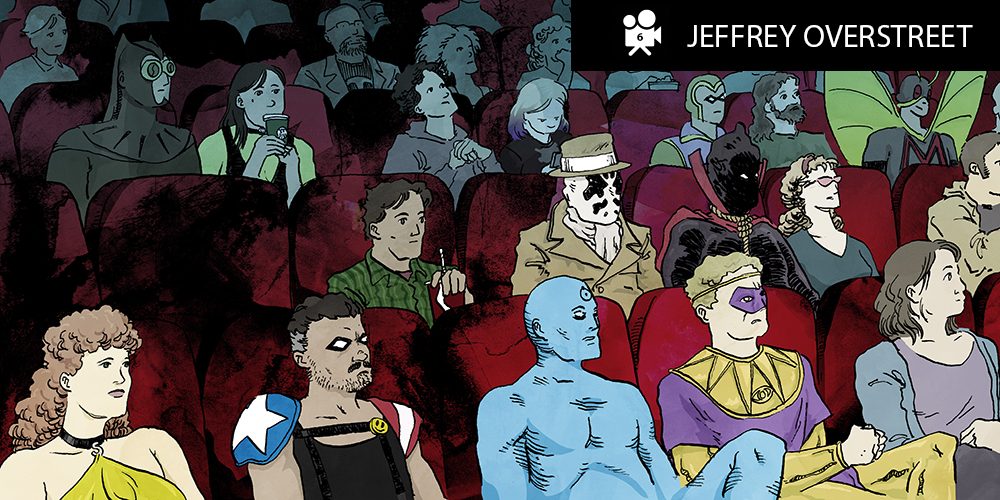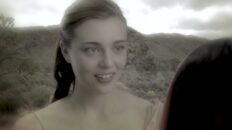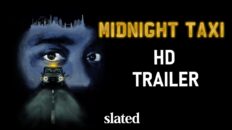Illustration by Seth T. Hahne
Jeffrey Overstreet is an educator at Seattle Pacific University and film and art critic who has been published in Christianity Today, Paste Magazine, Image Journal, and Christ And Pop Culture. He is also the author of a book on film criticism, Through A Screen Darkly, which was hailed as inspirational by director Darren Aronofsky, and a series of fantasy novels, The Auralia Thread. He also maintains a website of film, music, and arts criticism, Looking Closer.It was a great pleasure to speak with him about how he came to film criticism, some of his favorite films to introduce his students to, and what critics he finds inspiring.
RUD: Thanks for joining us and letting us ask you a few questions. Can you tell us a little bit about your background? What got you interested in film criticism? And how did how did your writing on film start?
Jeffrey Overstreet: I think there’s probably a couple of ways to approach this to get somewhere close to the truth. What I normally do when talking about how I got involved in film criticism is talk about my background in the church and growing up in a very conservative Baptist community. It was a community where I was taught to view the world outside of our church community as dangerous, and that included the arts. Sacred art, like hymns or religious iconography and certain literature that had been vetted by the church were acceptable. The only art that was acceptable for us was what we already believed.
But I was drawn to imagination and beauty and surprise and excitement and suspense. All the good things that suspend our disbelief when we are experiencing a great work of art. So while the intentions my community were good – they wanted me to be safe and not to marinate in violence and explicit sex and foul language and all that stuff – what they were doing was building a wall between me and the world and teaching me to see the world as evil and dangerous. So all that to say, I was not allowed to go to movies. I was not allowed to listen to popular music. There were occasional exceptions, but only those things that were carefully vetted. The Sound of Music was okay as a movie, for example. The Jesus of Nazareth series on TV, that was okay. Little House on the Prairie was okay. Mr. Rogers Neighborhood. Thank God that was okay.
Eventually I was given the freedom to watch more controversial adult entertainment. The effect that had was it made me incredibly curious about the movies. I loved reading and I would browse through the newspaper every day. I would see advertisements for movies that looked really exciting and imaginative and strange, and since I wasn’t allowed to go to the movies, but I was allowed to read the paper, I would read movie reviews obsessively trying to learn as much as I could so I could sort of play the movie in my head.
I experienced Jaws very differently than most people. All I had to go on was poster and the review. I would go and write a story based on that picture and those details I got from the reviews. So the very first work of fiction I wrote was about a diver trying to escape a massive shark. I still have it somewhere called The Sea Monster. Most kids probably have diaries from their childhood. I kept a sort of magazine where I wrote little reviews of everything that I watched or listened to or read. I became so fascinated with reviews as a way of processing something. I wanted to imitate the critics. I admired and envied their freedom to watch all the movies. I have file folders and drawers full of these little magazines I made between the ages of eight and probably 16 that are a complete record of everything I watched, listened to and read.
So that’s one way to tell the story of how I got into film criticism.
The other important way to talk about it is discovering Siskel and Ebert on television at a fairly young age. In my community arguing was seen as a bad thing. Arguing was equated to anger. And anger was equated with a loss of temper or loss of control. But there was an energy on the Siskel and Ebert television show that really captivated me because they were arguing, but they were friends and they could disagree about a movie. They seemed to get along. Of course, we learned years later that they couldn’t stand each other. But the illusion of their relationship was an incredibly influential model to me. I wanted to be able to argue about what I thought about something I was reading or seeing or listening to and have it not be a bad thing. When I got to high school and college, I gravitated to discussions of the arts because I realized that it’s not personal, that you can disagree and argue and learn from each other. And sometimes you will have different interpretations than somebody else. But that’s good. If you’re humble enough to listen.
So that’s the story of how I started writing film reviews and music reviews. I think I wrote more about music than movies actually and I have never stopped.
RUD: So then what was your first professional work as a critic?
Overstreet: As a critic everything has to do with timing. I graduated from Seattle Pacific University in 1994 and the internet was just becoming a thing. It was just opening up to people to send emails and join listservs and I got a job working for the Seattle Department of Construction and Land Use and I found myself working with their communications team building and writing content for their website. I was able to take those skills home and start publishing my own film reviews in various discussion boards.
I started writing little capsule reviews for a local radio station for free because they needed content for their website and it didn’t take long for me to say, “Why am I doing this?” I could build my own thing from my very particular perspective and go into much greater depth and be more personal about it. And eventually I went off on my own and started Looking Closer, which is still the archive for most of that material dating all the way back to the early 2000s.
That work prompted an invitation out of the blue one day. I’ll never forget. A guy named Steve Lansing who had been writing about film for Christianity Today was moving on from that job, and he recommended me to replace him. I didn’t know him. I had never approached Christianity Today to write for them. And so I got to write on a weekly basis for Christianity Today – writing to Christians, the community I grew up in – and trying to open their eyes to the rewards of the arts with courage and discernment rather than fear and separation. It felt like what I had been put on Earth to do. That was work that I felt extremely driven and purposeful about. It also led me to a community of discerning critics. Many of them Christians who have become some of my closest friends, some of the most influential role models in my life. I’ve also written for Image Journal quite a bit, and for Christ And Pop Culture, and for Paste Magazine. I guess those are those are the ones worth mentioning.
RUD: Well, and your book Through A Screen Darkly. Can you can you tell us a little bit about that?
Overstreet: Through A Screen Darkly was not something I had planned to write. I was talking with an agent and he asked me if I was interested in writing something along the lines of the film coverage I was doing for Christianity Today and turning that into a book. I sketched out a one-page proposal for what a book like that might look like, having no sense if it would go anywhere. He sent it out to a publisher who responded right away with a contract and that just blew my mind. Not just because I wasn’t looking for it. But because it came in during the same two week period as the contracts for my first two novels, so my life just flipped upside down. During that two week span, suddenly I realized that on top of my full-time job – I was working at Seattle Pacific University in their Marketing and Communications Office – I was also going to be coming home and sending five to six hours every evening working on these books.
The concept for Through A Screen Darkly was quite simple. There were a lot of books out there about faith and film but they were all about the dangers of movies and how movies were a toxic stew of Hollywood worldviews. They didn’t approach movies with love. They didn’t approach movies with confidence and excitement and a desire to find beauty in them and celebrate them. It was all about putting up your guard to make sure that you weren’t contaminated.
Right about that time at Christianity Today, the team of critics there were caught up in the controversy about the movie The Passion of the Christ. We were getting a lot of angry letters because we had not rated it as the best movie that year. And to readers of Christianity Today, that was like a betrayal of the gospel. Whereas to those of us on the team, we were saying, “Well, of course we love the gospel, but you can make a bad movie about a good thing. And The Passion of the Christ is not a bad movie, but it is not the finest achievement in filmmaking this year.” And that led to such angry mail and such tension, I decided the only way I know to respond to that controversy is to tell my life story through experiencing and discussing and exploring movies and bringing the lens of Christian freedom and discernment to them. So Through A Screen Darkly is sort of half memoir – it’s me telling stories about my life and the influence of movies on my life and how movies increase and strengthen my faith – but it’s also about how to approach a wide variety of films and how to discern what is truthful and beautiful, excellent, and well-made, from what is shoddy and manipulative and cheap.
I didn’t have any expectations about what would happen with the book, but it has gone on to become a popular textbook in classrooms about faith and film and culture. And now I’m teaching at Seattle Pacific University and using that book quite a bit to stir up conversations with students about their own experiences with film.
RUD: Your Looking Closer website is a repository of a lot of your writing on film and something you’ve maintained for many years. Can you tell us a little bit about how that has evolved?
Overstreet: The website has gone through all kinds of changes. It started as a branch of Promontory Artists and has now lived on its own as an independent site for a while. Now that I’m teaching at Seattle Pacific I’m finding it harder to post regularly on the site and so it is something where once a week or once every couple of weeks I post one substantial, personal essay about a film – something that takes more time to write. But the website has become a context in which I have met so many people around the world who have an eager to find conversation about art that takes movies seriously rather than just scanning them for things that might offend people or reasons that you wouldn’t want to show this movie to your children.
You know, growing up in a church that was very suspicious of the arts I was really lonely. I didn’t know if there were other people who found the arts as rewarding as I did. Through my work at Looking Closer, through my participation in artsandfaith.com (which is a discussion board), through my relationships with people at Image Journal, and publications like Christianity Today, I found such a rich and rewarding community of people who don’t see a contradiction between a faith and art.
RUD: And where did the name come from?
Overstreet: I think it actually came from, ironically, the movie American Beauty. I can’t remember exactly if it was in the film or in the promos for the film. But I remember the words “look closer” appearing on the screen in bold print. I’m not a fan of that movie. I think there’s some truth in the story it tells, but I also think it’s rather disingenuous and excuses lurid behavior, and I don’t think it’s aged very well. I think a lot of people now are very skeptical about it, but it was a huge hit at the time and I kept going back to watch it because so many of my fellow critics who I admire were so in love with it. I saw it three times, so that phrase “looking closer” sunk in because I kept thinking, “Well, I am looking closer but I’m still not excited about this movie.” But I think it was sort of like a dandelion seed floated through the air from the movie screen and landed in my brain and I kept thinking about how that phrase was what I wanted to do in my writing about the arts. And so it felt like the right name for the site.
RUD: You’ve done a lot of writing on film, but also a lot of interviews. Is there a favorite interview with director or actor you could talk about? Maybe something that stood out to you, that you still think about, or influences you in some way?
Overstreet: I keep thinking that one of these days I need to make a comprehensive list of all the interviews I’ve done. The other day I discovered a cassette tape of a conversation with Alfonso Cuarón and I couldn’t remember interviewing him. And that’s a big deal because he’s made some of my favorite films.
I think the interviews that have meant the most to me have actually been with musicians. I’ve interviewed Linford Detweiler of Over the Rhine several times and that became the kindling for a friendship has been very meaningful in my life. We discovered that we got married on exactly the same day in ‘96 and that has led to annual dinners where we check in on each other’s marriages and share what we’ve learned as these unusual married couples where both husband and wife are dedicated to lives of making art. I’ve interviewed Sam Phillips several times. She’s been the most influential artist in my life as far as challenging me think about the relationship between art and faith.
But when it comes to film, conversations that stand out for me are the interviews with the cast and crew of Return of the King because they all had such wildly different interpretations of their own movie. Ian McKellen, for example, interprets The Lord of the Rings as a story about how the ideal culture can only exist if it refuses to have anything to do with the church or religion. My conversation with Martin Scorsese about the movie Silence was one I will never forget. It was a very exciting opportunity to ask questions of someone who’s movies have really changed my life.
I’m very fond memories of my three encounters with Charlie Kaufman, particularly that we bonded over enthusiasm for Walker Percy’s book Message in a Bottle while we were talking about the movie Eternal Sunshine of the Spotless Mind. In the last few years I also interviewed a filmmaker most people will not be familiar with, Lee Isaac Chung, several times and found him to be so inspiring and curious, humble, and eager to work with people who have had different experiences and are from different cultures. His parents were Korean immigrants to America. He grew up on a farm in Arkansas and made a movie in Rwanda called Munyurangabo that Roger Ebert brought to the world’s attention. Recently he and his family moved to Korea where he is teaching film and working on a new film about a Korean American boy on a farm that will be very autobiographical. I just read a part in a public reading of the screenplay for that film and was very moved by that script.
Also, interviewing the poet Scott Cairns and the singer-songwriter Joe Henry were very meaningful conversations to me.
RUD: I’d like to ask you to talk about your approach to movie lists. You have been critical of the Academy Awards and the idea of objectively ranking films in “best of” lists. Can you speak a little about this and why you have come to this point of view?
Overstreet: My tongue is firmly tucked in my cheek when I express aggravation with “Best” lists. I love lists and list-making. When I was a kid, my first awkward steps toward a life in criticism were made by making lists of my favorite films and songs for each year. Lists are one of the most revealing ways to celebrate, honor, and recommend films. I revise and amend my annual lists at Looking Closer and on Letterboxd all the time. But the more I read reviews and talk with moviegoers, the more I’m impressed by how personal and individual our experiences with art really are. What I experience when I go to a movie for the first time has a lot to do with the filmmakers’ artistry, but it also has to do with me: with my memories, my fears, my curiosities, my interpretations. So when I post a list of the films I think are most impressive in a particular year, my list will reflect something of my assessment of artistry and excellence, but it will also tell you something about me. And that’s great! That’s why I read critics’ lists and why I ask my students to make lists: I learn about their hearts and minds and areas of expertise.
As a result of that, I have to laugh over lists that take the word “Best” seriously. So much depends on the criterion in question, the experience and personality of the judge or jury, the breadth of work being considered, and on and on. If anyone wants to declare the “Best” of a particular year, they’d need to begin by having a way of not only seeing all of the year’s films, but giving substantial time and attention to those that are clearly worthy. Add to that the complicating factor that even mediocre films are appreciated differently over time, with films that are immediately celebrated fading in critical assessment over the years, while some that seemed shrug-worthy at first come to mean more and more to audiences and critics over time.
So I do prefer “favorite” — or some distinction other than “best”: something that indicates humility on the part of the curator, and an acknowledgement that this is a recommendation but not an assertion of authority that nobody can really claim. I look back at lists I published ten years ago and I shake my head, because I’ve learned so much since then, and changed, and the more intently I insisted on the greatness of my choices the more embarrassed I’m likely to be now.
RUD: Is there a film – not necessarily your favorite – that you’re always excited to introduce someone to who hasn’t seen?
Overstreet: Oh, wow. Hundreds. In the last couple of years of teaching film at Seattle Pacific I’ve been most excited about and pleased with the results of introducing students to Three Colors: Blue, which is one of my favorite films. That’s a film they struggle with at first. But then the discussion opens up and they get very excited about it. The same would be true of Babette’s Feast. But those are films that get a lot of attention I think from film critics and especially from faith focused film critics.
I really love introducing audiences to a little film called The Fits by Anna Rose Holmer, which is about bunch of African American girls in a community center in a competitive dance troupe practicing for a competition and one young woman there who is torn between the exhilaration she gets from boxing with her brother in the boys half the community center and the pressures and challenges she feels in the dance troupe. It becomes a story about this girl trying to figure out who she is in this complicated world. And then right in the middle of that, a whole bunch of the girls around her start suffering seizures and that brings an element of fear and even supernatural influence into the to the mix. It’s a very strange film, but I think it’s one of the most powerful films I’ve seen about finding your calling. And also a very powerful film about adolescence and figuring out who you are in the middle of all these changes and terrors. Moonrise Kingdom also always inspires a really lively conversation students. Those are the ones that spring to mind.
RUD: Are there any critics writing today that you try to keep on top of or that stands out to you? Critics you enjoy reading yourself?
Overstreet: Steven D. Greydanus is one of my closest friends and someone I admire beyond my capacity to express. He is a remarkable critic, incredibly prolific, he writes with that extremely accessible clarity that made Roger Ebert so beloved and so popular while also bringing incredible discernment and wisdom to his work. He tends to focus on commercial films and even more specifically on films for families. I always hope to find reviews of his for some of the more obscure independent art films that mean so much to me, but I know that he has a very good sense of who his audience is. But I am always blessed in some way by reading a review of his. I’ve been frustrated in recent years because I can’t keep up with him as far as my own review output. For many years I felt like our reviews were in dialogue with each other and now I can’t even keep up.
One critic whose passion for exploring the wider world of cinema whose perspectives have led me to some of my favorite discoveries would be Darren Hughes, who doesn’t write film criticism regularly. But there’s just something about what excites him at the movies that when I track down the film, I always inevitably love it.
I’m also a big fan and supporter of Alissa Wilkinson. And Matt Zoller Seitz, the editor of RogerEbert.com. I can’t imagine that job after Ebert passed away going to somebody better. Seitz has the joy and passion the tirelessness to pick up where Roger left off.
I should also mention Lauren Wilford who graduated from Seattle Pacific not that long ago. I remember her as a student writing about film and art with such passion and enthusiasm that I was almost frightened of her. She is a force to be reckoned with and probably should have been teaching classes while she was an undergrad. She very quickly found a home writing for Bright Wall/Dark Room and editing work there. That is a wonderful long form criticism website. Probably the best one on the internet. Her longer essays about film are texts that I teach in my writing classes. Particularly, her essay on Hitchcock’s Vertigo, her essay on Eggers film The Witch, her essay on My Neighbor Totoro. These are fantastic achievements in personal essay and art appreciation and I’m just so glad that she’s out there doing what she’s doing.








